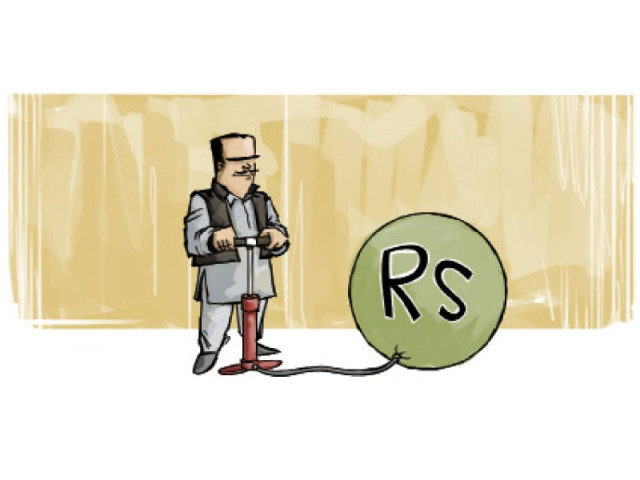Election campaign: Previous govt spent $3.5b to stem rupee slide before polls
The amount accounts for up to three-fourth of total loss in currency reserves during FY13.

The amount accounts for up to three-fourth of total loss in currency reserves during FY13. ILLUSTRATION: JAMAL KHURSHID
In what appeared to be sheer mismanagement of precious foreign currency reserves, the Pakistan Peoples Party government with the help of the State Bank of Pakistan (SBP) threw a $3.5 billion into the market to defend a weakening rupee during the run-up to elections, reveals a report by the International Monetary Fund (IMF).
The intervention in the market seemed quite irrational as the amount of dollars used to defend the rupee made up about three-fourth of the total depleted reserves in the financial year 2012-13, ended on June 30.
The move, launched to win support during the elections heightened chances of a balance of payments crisis, forcing the new government to immediately knock the door of the IMF to seek a $6.7 billion bailout package. The SBP used one-third of its total reserves for defending the rupee under political compulsions, which is more than half of the money the government has now borrowed from the IMF.
“The SBP intervened to hold the exchange rate roughly constant during the run-up to elections in the first half of 2013. Net SBP sales in the interbank market totaled about $3.5 billion in fiscal year 2012-13”, said the latest IMF report.
The IMF said the rupee depreciated 5.3% against the dollar in the previous fiscal year. The fact that the SBP managed the rupee in the last fiscal year can be established from the fact that the rupee depreciated by 5% in just the first two months of new fiscal year.
There have been reports about the SBP’s intervention in the market but nobody knew the extent of interventions except the United States Treasury, according to sources in the SBP and the Ministry of Finance. The US Treasury was opposed to the move and warned the Pakistani authorities about its adverse implications, they added.
In June 2012, the reserves held by SBP stood at $10.8 billion, which fell to $6.1 billion by June this year, showing depletion of about $4.8 billion in one year, according to SBP. Out of $4.8 billion, the SBP lost $3.5 billion or 73% in defending the rupee during the election stunt. The depletion of reserves due to the country’s debt obligations was just $1.2 billion, roughly one third the amount of money used to defend the local currency.
The Pakistan Peoples Party, did not want the rupee to slide, as it did not want other political parties to exploit the issue in the build up to the elections, in addition to avoiding adverse impact of devaluation in the shape of increasing prices of all imported items, particularly fuel, so close to the national elections, said sources.
The sources in the SBP said that entire interbank market intervention was to protect the rupee, which was sliding largely because of weakening economic fundamentals and also partly because of volatility in the market.
The Express Tribune contacted the SBP governor to seek his comments on the rationale behind the move and whether he takes responsibility for bringing the country to the door of the IMF.
“This (issue) has been taken out of context and I will explain (to the IMF)”, said Governor SBP in a written comment. He wrote that an IMF team would meet him on Saturday and he will explain the use of reserves to the team. The governor did not deny that he used reserves to defend rupee.
According to independent economists, central banks often intervene in the market when there is volatility but there is a limit to intervention, as the central bank cannot go on when reserves are limited and more importantly when currency depreciates due to flagging economy. On average, the SBP used $292 million per month to defend the rupee.
The analysts say that central banks increase interest rates to build reserves, but Pakistan’s central bank reduced interest rate by 3% and lost $3.5 billion.
Published in The Express Tribune, September 15th, 2013.
Like Business on Facebook, follow @TribuneBiz on Twitter to stay informed and join in the conversation.





1733130350-0/Untitled-design-(76)1733130350-0-208x130.webp)











COMMENTS
Comments are moderated and generally will be posted if they are on-topic and not abusive.
For more information, please see our Comments FAQ